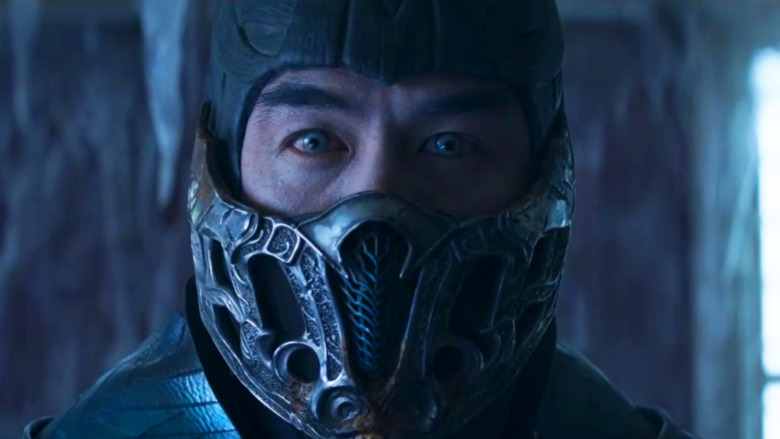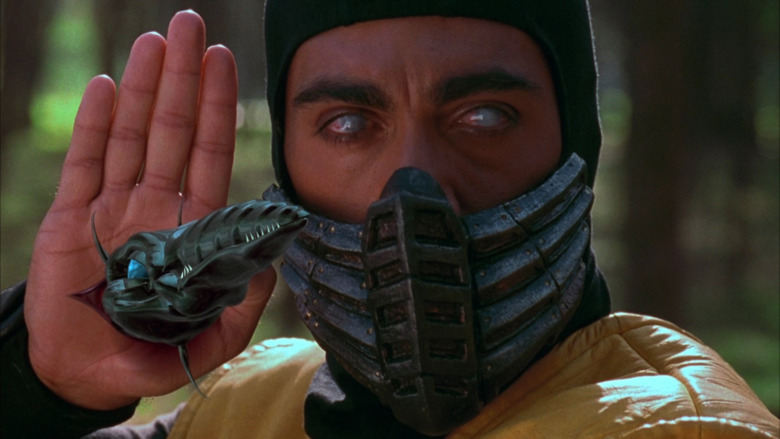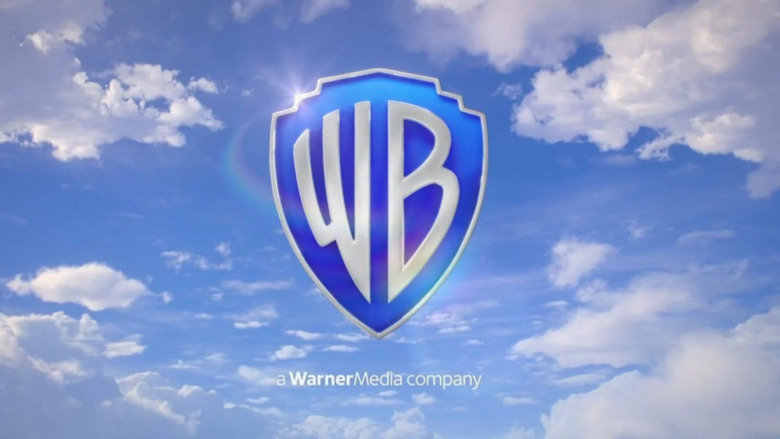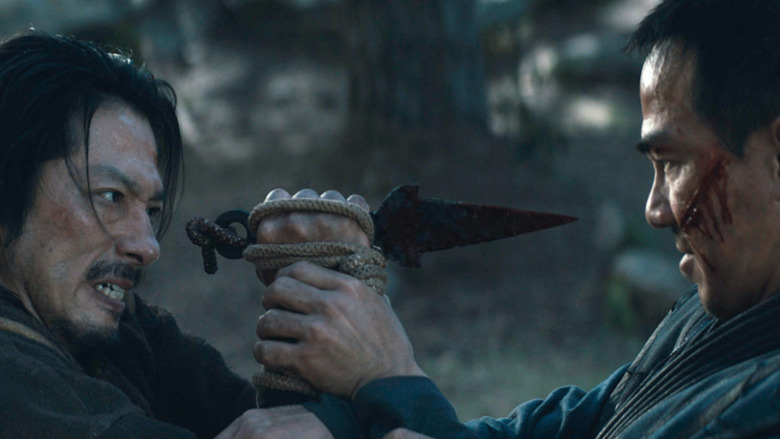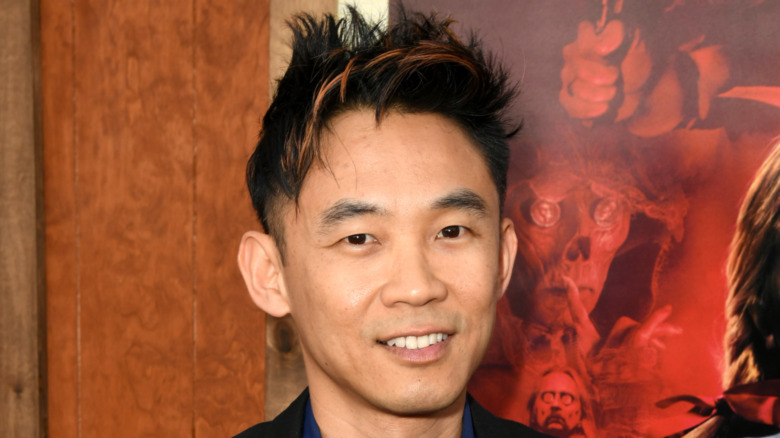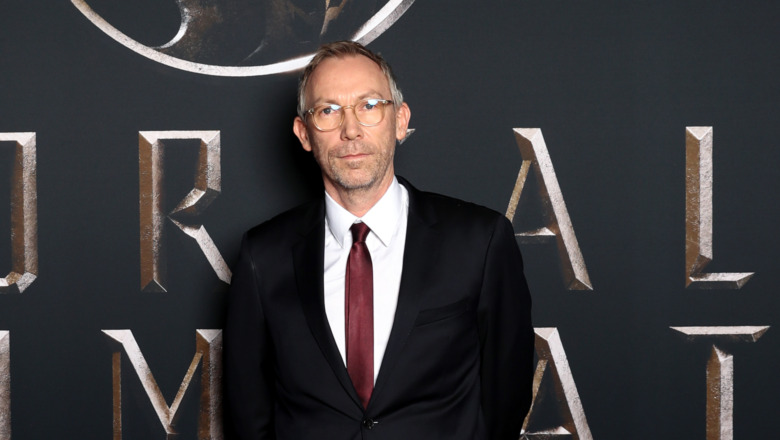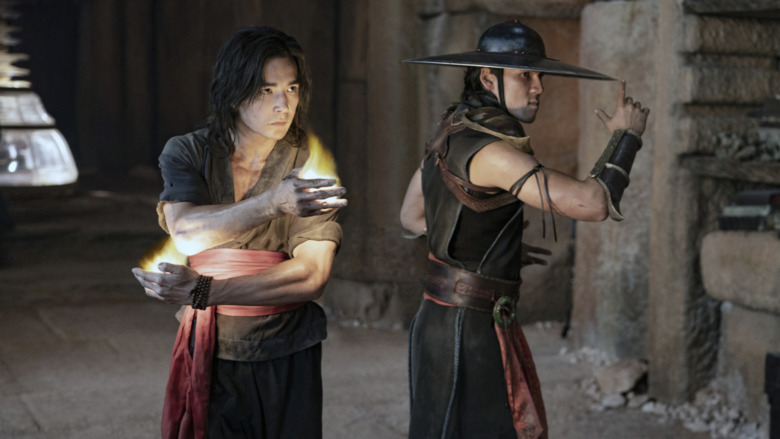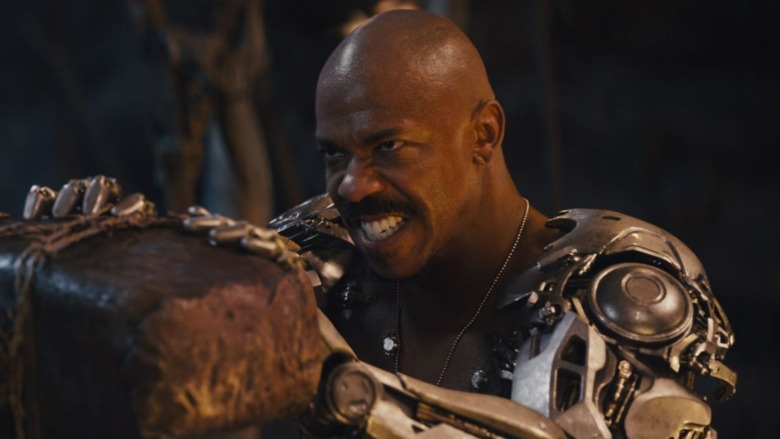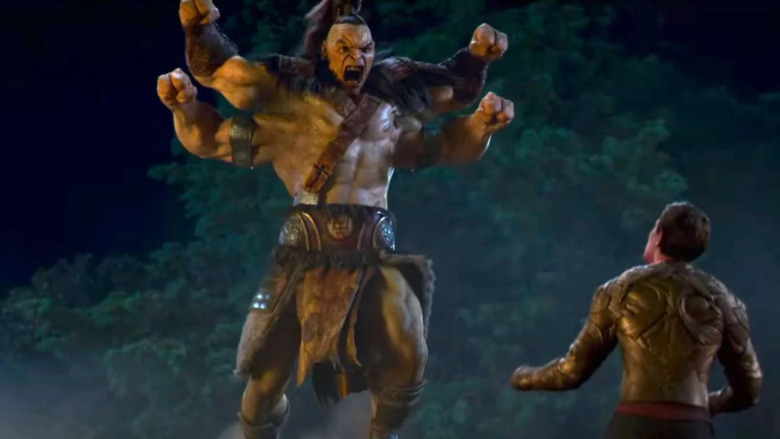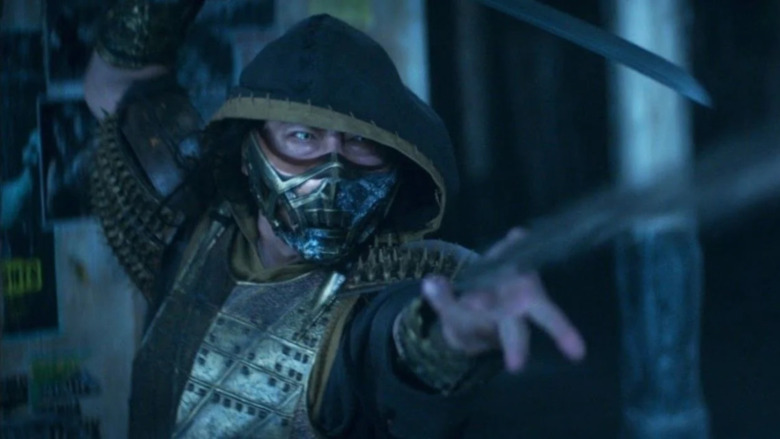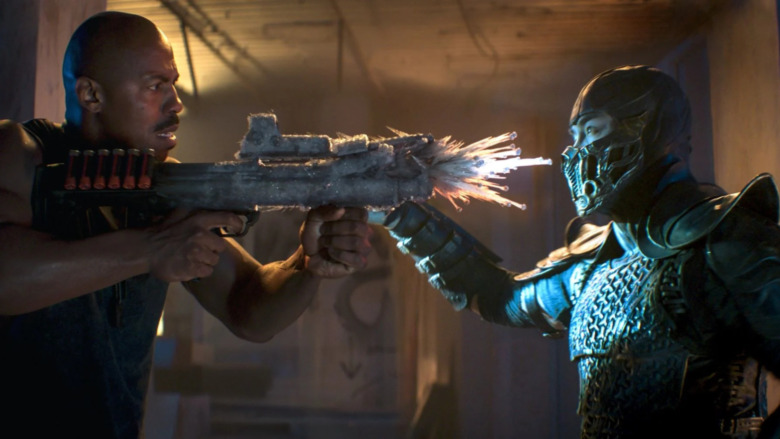The Untold Truth Of 2021's Mortal Kombat
Every big-name property is getting adapted into a major Hollywood blockbuster these days. Even video game movies, long seen as guaranteed box office bombs, are starting to deliver hits like "Sonic the Hedgehog." Given this phenomenon, it's easy to figure out where the 2021 reboot of "Mortal Kombat" came from. If a film adaptation of this video game could deliver robust box office returns back in 1995, surely an adaptation more faithful to the source material, buoyed by decades of nostalgia, could score an even bigger haul.
However, just as the seemingly simple "Mortal Kombat" fighting games actually have a dense wealth of lore behind them, so too does this feature from director Simon McQuoid contain a much more complicated behind-the-scenes history than you might expect. This movie faced its fair share of struggles: The company responsible for the "Mortal Kombat" games went into bankruptcy, the movie lost its initial director, and the COVID-19 pandemic had an adverse impact on the film's release date. Despite all these obstacles, "Mortal Kombat" was finally finished and released to the public in April 2021. We're here to explore the ups and downs of 2021's "Mortal Kombat," from its unique director to its long road to completion.
The third Mortal Kombat movie that wasn't
Believe it or not, the original "Mortal Kombat" movies weren't supposed to end with "Mortal Kombat: Annihilation." Initially, there were plans for this take on the "Mortal Kombat" mythos to span three whole movies. However, it never got off the ground, with modern-day speculation indicating that this was due to lackluster box office grosses and derisive fan response to "Annihilation."
Though there haven't been reports of a script developed for this mythical third "Mortal Kombat" movie, Threshold Entertainment tried to build up hype for it on occasion. This is most notably evidenced by a 2001 poll gauging which "Mortal Kombat" fighter fans most wanted to see die in a third film. However, progress was nonexistent on this production, which left the franchise dormant for decades. Fans of the original "Mortal Kombat" movies were understandably disappointed with this outcome, and the original movie's cult following suggests there could have been a sizeable audience for further adventures in this interpretation of the universe. However, there's a silver lining to every stormy cloud: The absence of an "Annihilation" follow-up did help pave the way for the modern-day reboot of the "Mortal Kombat" series.
Warner Bros. buys up the Mortal Kombat property
For decades, Warner Bros. has owned everything from DC Comics to the pre-1986 library of MGM movies. But in 2009, the company added another major roster of famous titles and characters to their library of projects. This came as a result of the game publisher Midway Games going under. This was the outfit responsible for seminal video games ranging from "Rampage" to "Mortal Kombat." Despite leaving a massive impact on the world of video games, the company faced extreme financial pressure in the modern world.
Once the process of bankruptcy wrapped up, it was time for the company and its intellectual property to find a new home. After some uncertainty over where they'd land, Midway Games, and the entire "Mortal Kombat" franchise, wound up at Warner Bros., with the company paying just $33 million to indefinitely own these iconic games. It's a fitting home for the franchise, given that the studio had, at the time, recently absorbed New Line Cinema. Among that movie studio's dense library of titles are the two 1990s "Mortal Kombat" movies. Having already assimilated the "Mortal Kombat" films, Warner Bros. now controls the entire "Mortal Kombat" franchise.
Once Warner Bros. scooped up Midway Games, speculation immediately ran rampant regarding "Mortal Kombat" on the big screen. A little over a decade later, that post-purchase chatter came true.
Kevin Tancharoen's version of Mortal Kombat
In the summer of 2010, interest in seeing a new cinematic take on "Mortal Kombat" was reignited by the release of a fan film entitled "Mortal Kombat: Rebirth." The project is the brainchild of director Kevin Tancharoen, who was suddenly on everyone's mind as a potential director for a new "Mortal Kombat" movie. Turns out, Tancharoen was also thinking the same thing: "Rebirth" was meant to be a test film to show Warner Bros. what his "Mortal Kombat" movie could look like.
Tancharoen was hired in 2011 to officially tackle a "Mortal Kombat" reboot. It was a big move for the filmmaker, whose feature-length directorial efforts up to that point were "Fame" and "Glee: The 3D Concert Movie." With initial reports claiming that filming would start in 2012, it looked like "Mortal Kombat" was going full-steam ahead. However, even with Tancharoen onboard to direct, this new take on "Mortal Kombat" kept getting pushed into the future. Eventually, Tancharoen left the production in 2013. This left the "Mortal Kombat" reboot without a director for a whopping three years.
Though "Rebirth" signaled that Tancharoen was perfect to tackle a new take on this video game franchise, this was one movie and director pairing that was never meant to be.
James Wan signs on
James Wan and Warner Bros. have developed a close relationship over the years. This is a tad unorthodox, as Wan's initial films, "Saw" and "Insidious," were largely made outside of the studio system. However, this unexpected bond formed after Wan directed the 2013 Warner Bros. hit "The Conjuring," which was quickly followed up by Wan helming "The Conjuring 2" and "Aquaman." As part of his close alliance with the studio, Wan signed on to produce a new "Mortal Kombat" film in August 2015, just months after directing the Universal blockbuster "Furious 7."
The timing of this deal doesn't just reflect Wan's close ties to Warner Bros. — it also signals the trajectory of his career. "Furious 7" was a runaway success, proving Wan could expand beyond the horror genre. He was also now someone associated with properly handling big-budget action movies belonging to well-established franchises. Wan stayed onboard this version of "Mortal Kombat" as a producer during its six years of production, while simultaneously furthering his ties to Warner Bros. by directing films including "Aquaman" and "Malignant."
Finding the right Mortal Kombat director
You may not realize it, but you've likely been exposed to director Simon McQuoid's work. Having helmed countless commercials, including a memorable Duracell "Star Wars" ad, McQuoid's visually-distinct oeuvre has been seen all over the world. But after years in this field, McQuoid was looking to move from directing advertisements to helming feature-length projects. His first foray into the field came in the form of the "Mortal Kombat" reboot: The news that McQuoid was directing "Mortal Kombat" broke in November 2016. McQuoid's aforementioned "Star Wars" commercial was apparently the project that put him on the producers' radar.
In terms of his "Mortal Kombat" approach, McQuoid explained in 2021 that "everything has to feel authentic ... It doesn't feel like there's that veneer of sort of special effects over everything. That for me is the ultimate sort of fantasy of science fiction films is when you really believe." That sort of vision is just what this production, which looks to distance itself from the campy vibes of the 1990s "Mortal Kombat" movies, needs. Add to that McQuoid's prior experience in filmmaking, and it becomes clear how he ended up being the director of this new "Mortal Kombat" film.
Getting an ensemble cast together
After Simon McQuoid was brought on board, news on the "Mortal Kombat" movie was quiet for years. If fans thought the project had become the newest attempt at restarting "Mortal Kombat" to go under, they were justified. However, in July 2019, exciting developments finally began to creep in as the film's cast was assembled. Jon Taslim was the first cast member announced, followed by names like Mehcad Brooks, Tadanobu Asano, Sisi Stringer, and Ludi Lin. Lin's presence is especially interesting, as he worked with producer James Wan on "Aquaman," another Warner Bros. blockbuster, in 2018.
From there, the cast kept growing, and a project once shrouded in silence began to trumpet its bold new actors. Lewis Tan, who had previously been a contender to play Marvel heroes Iron Fist and Shang-Chi, became one of the rare members of the cast not playing someone familiar to longtime fans of the franchise. Tan portrays an original character named Cole Young, who serves as the film's protagonist.
Fans had to be patient to see it happen, but after so much radio silence, the "Mortal Kombat" cast was finally assembled.
Mortal Kombat gets shot down under
When it came time to actually shoot the new "Mortal Kombat" movie, director Simon McQuoid and James Wan opted to shoot the project in a territory familiar to both of them: Their native Australia. When filming began in September 2019, it was revealed that the production was engaging in principal photography in South Australia's Adelaide Studios. As Adelaide has largely been a shooting location for local Australian fare, "Mortal Kombat" provided a big-budget departure from the norm.
Shooting in this location had a number of benefits for the "Mortal Kombat" reboot. For one thing, it brought the production close to home for some of the movie's leading actors, such as Jessica McNamee and Josh Lawson. Additionally, it helped to further separate this new reboot from the pair of 1990s "Mortal Kombat" films. This newest "Mortal Kombat" feature has worked tirelessly to distinguish itself, and that includes the backdrop for its principal photography.
A commitment to being rated R
The pair of live-action "Mortal Kombat" movies from the 1990s deliver stories that firmly fit within the parameters of PG-13 filmmaking. While this allows each film to attract teenage audiences, it also means that the gruesome violence that defines "Mortal Kombat" is totally absent. Over the years, this became nothing short of a punchline in discussions of the original two films, as fans grappled with the quandary of how something so crucial to the games could be excluded.
When it came time for a reboot, fans around the world hoped for something more accurate. These fans got their wish, as the new "Mortal Kombat" movie is indeed rated R. It's a rating that director Simon McQuoid was insistent upon when developing the feature, in fact. "The rules around [MPAA] ratings aren't what a lot of people think they are," McQuoid explained. "It's amount of blood, it's amount of red, it's interpretation of how you go about it. We had a lot of discussions about getting the balance right so there was gore and there was blood and there were fatalities. And there is gore, blood, and fatalities." Keeping all of that "red" at the center of this new movie resulted in an MPAA rating that promises all the gruesome carnage fans of this franchise are familiar with.
How the pandemic affected production
"Mortal Kombat" wrapped up shooting just before the end of 2019. The film initially had plenty of time between the end of shooting and its original January 2021 release date. However, this schedule was put together under normal circumstances. As "Mortal Kombat" entered post-production in 2020, normal circumstances were soon hard to come by. By March 2020, the COVID-19 pandemic had totally upended the entertainment industry. "Mortal Kombat" was no exception: While principal photography was finished, reshoots had yet to be completed when the pandemic took hold.
This was revealed in a tweet from "Mortal Kombat" producer Todd Garner, who divulged details on the hold-up: "We'd always planned for it & thought we'd do it in March. The pandemic had other plans. We won't have a release date for the movie until theaters re-open. Same for trailer." The pandemic clearly had adverse effects on the production of "Mortal Kombat." However, the overall impact would turn out to be minimal, at least compared to other movies. "Mortal Kombat" managed to come out just three months after its original release date, which indicates the production was able to resolve issues in a timely manner.
The rare Mortal Kombat production released in Japan
2021's "Mortal Kombat" achieved a number of firsts. For one thing, it's the first live-action movie adaptation of the video games to garner an R rating. It's also the first time that a largely non-white cast has been utilized in this franchise. In terms of a more specific and obscure breakthrough, though, this new "Mortal Kombat" movie is a rare instance of an entry in this franchise getting released in Japan.
Japan has had minimal exposure to the "Mortal Kombat" video games: Many of the franchise's installments have never been released there, due to restrictions on the kind of violence that can be displayed in Japanese video games. The absence of major pop culture notoriety, however, didn't prevent the first two "Mortal Kombat" movies from getting released in Japan, due to their PG-13 nature.
With this newest "Mortal Kombat" movie approved for general release with all its grisly violence intact, Japanese moviegoers will get a chance to see the kind of carnage that has frequently been kept off their video game shelves.
